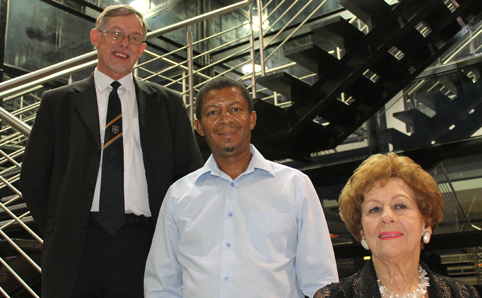Latest News Archive
Please select Category, Year, and then Month to display items
02 January 2025
|
Story Edzani Nephalela
|
Photo Lethabo Machabaphala
 From the left are, Prof John Klaasen, Dean of the Faculty of Theology and Religion; Prof Vasu Reddy, Deputy Vice-Chancellor: Research and Internationalisation at the UFS; Prof Anthea Rhoda, acting Vice-Chancellor and Principal of the UFS; Prof Allan Boesak; Prof Nico Koopman, Deputy Vice-Chancellor: Social Impact, Transformation and Personnel at Stellenbosch University; and Dr Eugene Fortein, Senior Lecturer: Historical and Constructive Theology at Prof Boesak’s book launch.
From the left are, Prof John Klaasen, Dean of the Faculty of Theology and Religion; Prof Vasu Reddy, Deputy Vice-Chancellor: Research and Internationalisation at the UFS; Prof Anthea Rhoda, acting Vice-Chancellor and Principal of the UFS; Prof Allan Boesak; Prof Nico Koopman, Deputy Vice-Chancellor: Social Impact, Transformation and Personnel at Stellenbosch University; and Dr Eugene Fortein, Senior Lecturer: Historical and Constructive Theology at Prof Boesak’s book launch.
In a world increasingly defined by the stark contrasts of power and vulnerability, the concept of democracy often reveals itself as a double-edged sword. For the children of struggle – those who have grown up amid the chaos of inequality and conflict – democracy can feel like a distant promise, an ideal often outmanned by the realities they face. The deception of hope lingers in the air as aspirations clash with systemic barriers, leaving many to navigate a landscape where a harsh daily existence obscures the principles of freedom and justice. This exploration seeks to uncover the intricate dynamics between hope and disillusionment, shedding light on the lived experiences of those who yearn for a brighter future yet grapple with the weight of unfulfilled promises.
This was the essence of the public lecture titled Outmanned by Democracy: Children of Struggle, Deception, and Hope, presented by Prof Allan Boesak, a theologian and political activist, on the Bloemfontein Campus.
Prof Boesak confronted the continuous socio-economic challenges faced by South Africa and other nations, including racism, narrow ethnic nationalism, and the revival of tribalism. He emphasised the role of churches in tackling these issues. “The responsibility of churches is to articulate what politicians are often afraid to say,” he stated. “Put your ideologies into practice and leverage your power as ministers of the Word to shape the future and reclaim the dignity of your people. This is where unity transcends colour and stature. Consider the various roles that churches could play in reconciling communities, as seen in the Gaza crisis.”
During his visit to the UFS Faculty of Theology and Religion, Prof Boesak also launched a four-volume set titled The Fire, The River and the Scorched Earth: Fifty Years of Black Theology Through the Lens of Allan Boesak. The first three volumes include his lectures and responses from various theologians, while the fourth contains his sermons. This body of work aims to document, critique, and celebrate the contributions of black theology, highlighting its role in the struggle for justice and liberation and underscoring Prof Boesak’s unwavering commitment to freedom, liberation, and democracy.
In a time when hope and disillusionment coexist, Prof Boesak’s insights remind us of the transformative power of faith and activism in the continuing fight for a more equitable world
Two new buildings for Health
2012-03-06
 |
|
The James Moroka building and the Muller Potgieter building of the Faculty of Health Sciences were officially taken into use in February this year. Present at the ceremony was from left Prof. Gert van Zyl, the Dean of the Faculty of Health Sciences, Mr Benjamin Moroka, son of Dr James Moroka, and Mrs Mari Potgieter, wife of Dr Muller Potgieter.
Photo: René-Jean van der Berg
06 March 2012
|
The university of the Free State boasts two new modern buildings on the Bloemfontein Campus that were erected specially for the Faculty of Health Sciences.
The James Moroka building and the Muller Potgieter building were officially taken into use recently. Family members of Dr Moroka and Dr Potgieter were present and unveiled the cornerstone.
The Faculty of Health Sciences experienced a growing shortage of office space and lecture halls on campus. To address the situation, the grounds of the old vehicle pool were used to construct the buildings. Its prime location – opposite the faculty’s existing building – was a bonus.
The National Department of Higher Education and other interested parties worked together to construct the buildings in as short a time as possible. The buildings have been in use since the beginning of the year.